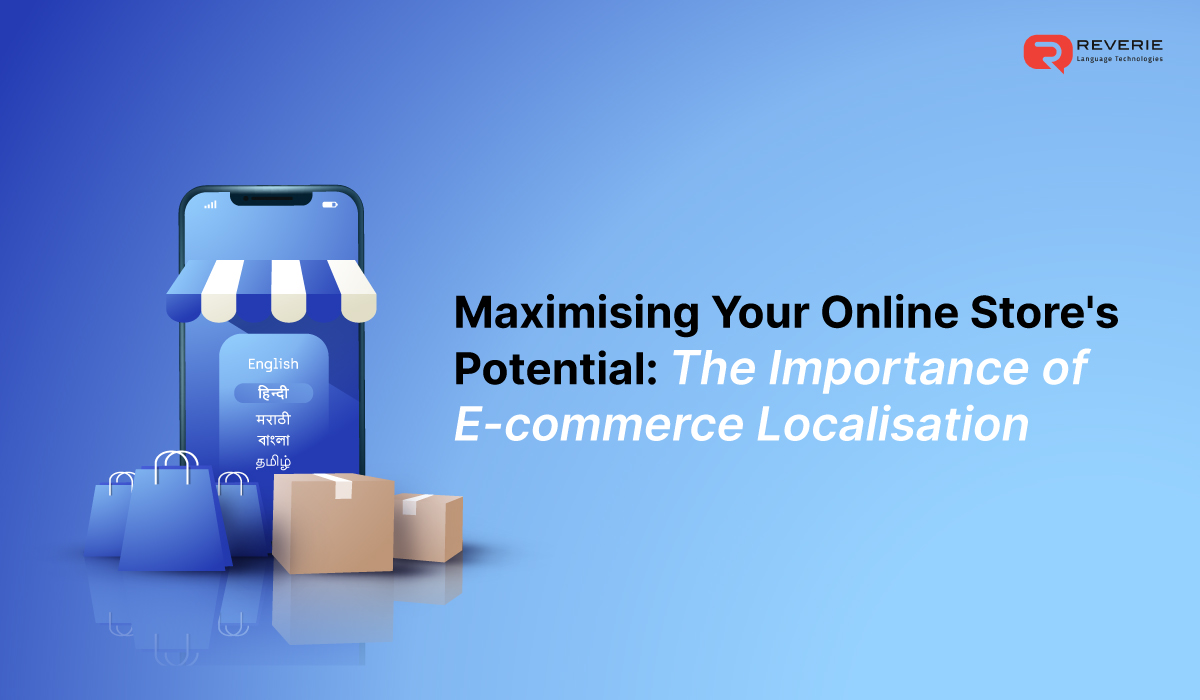An online store enables businesses to reach a much larger audience and sell their products to a wider range of customers. It lets them connect with their potential customers from all around the world. That is why e-commerce has now become a vital part of the retail industry.
However, with a wider reach comes the need to localise your online store. In today’s digital era, consumers expect to have a seamless and personalised experience when they shop online. In 2020, CSA Research conducted a survey in 29 countries, including Asia, North America, South America, and Europe. This survey revealed that 76% of consumers preferred buying products online when the information is in their own language.
This shows that speaking the language of customers is vital for a business to succeed. It becomes especially important in a country like India, where 22 languages are officially recognised by the government. E-commerce localisation helps businesses achieve the goal of connecting with their customers in their native language.
In this post, we are going to learn about the importance of e-commerce localisation and how Reverie’s suite of language technologies can help businesses in this process. But first, let’s discuss what localisation in e-commerce means.
Getting Familiar With E-Commerce Localisation
An e-commerce localisation process involves adapting online stores for consumers in a specific region based on their language, culture, and preferences. The localisation is not restricted to just the e-commerce website or app; it also includes customer support, user journeys, and marketing campaigns. It’s important to note that localisation is not just about translating the content of a website. It is a long and complex process that involves a number of components, including:
- Translating website content
- Translating SEO metadata
- Taking cultural and regional sensitivity into account
- Translating media, including images, infographics, and logos
- Currency symbols and formats
- Ensuring relevant formats for dates, addresses, and phone numbers
- Compliance with local regulations and laws
In simple words, e-commerce localisation is a complicated process. But, it ensures that the businesses can operate in a multiple markets without any cultural and linguistic barriers. When your target audience understands your e-commerce platform, the chances of them making a purchase and coming back for more increases. Fortunately, advanced language technologies, like the ones offered by Reverie, can ease the process of localisation for businesses. Let’s move forward and understand the importance of e-commerce localisation in detail.
Importance of E-Commerce Localisation
Here’s an expanded look at why e-commerce localisation is not just beneficial but also essential for businesses that want to operate in a very linguistically diverse country, like India.
Local Marketing
E-commerce localisation enables businesses to tailor their marketing efforts to a specific target audience. This also includes SEO opportunities. By localising the website and SEO strategy, businesses can significantly improve their online visibility on regional search engines. According to a case study done by Neil Patel, co-founder of KISSmetrics and Crazy Egg, localisation can help boost overall traffic by 47%.
Local Presence & Competitive Advantages
India has a very competitive e-commerce market. Both global giants and local businesses are competing for the attention of the same pool of consumers. Only the brands that are able to build trust with their potential audience win. This is where localisation provides businesses with an edge over their competitors in establishing a local presence. By localising their e-commerce platforms, businesses can adapt to the local language, culture, and preferences. This helps in building a strong brand image and establishing itself as a reliable and trustworthy brand.
Better Conversion Rates
With localisation, businesses can not only attract their target audience but also convert them into loyal customers. Customers are more likely to purchase from a website that provides information in their language and understands their cultural nuances. This also includes payment options that are widely used in their region.
Enhanced Personalisation
Reports have shown that e-commerce websites that offer personalised product recommendations witness a 10% to 15% increase in conversion rates. The same report also suggests that personalised product recommendations also increase customer satisfaction rates by 20%. Localisation makes it easier for businesses to personalise their website content based on the customer’s location.
How Reverie Helps in E-commerce Localisation
Implementing e-commerce localisation can be overwhelming, especially in a country like India. The biggest challenges faced by businesses include the linguistic diversity of the country and cultural nuances.
Businesses require a nuanced approach and sophisticated tools to handle the complexity associated with the localisation process. This is where Reverie’s suite of language tools can help businesses overcome these challenges. With products like:
- Anuvadak for website localisation
- Prabandhak for managing translation projects,
Reverie provides businesses with an end-to-end solution for efficient localisation. In addition, Reverie also boasts of APIs for translation, transliteration, text-to-speech, speech-to-text, and natural language understanding (NLU). These APIs help businesses to seamlessly integrate and automate localisation processes. This allows businesses to connect with their target audience in a meaningful way.
Real-World Examples of E-commerce Localisation
Various big players in the e-commerce industry have long understood the importance of localising their websites. One of the most prominent examples is Amazon. The brand invested heavily in a Rural India strategy. This strategy included localisation efforts and building a logistic network. Amazon added various Indian language product descriptions, payment methods, and customer support options. Because of these efforts, Amazon is able to offer more personalised and user-friendly shopping experiences to its Indian consumers.
Other major brands that have successfully implemented localisation are Myntra (which allows customers to shop in 11 Indian languages, including Hindi) and Flipkart (which is available in 8 Indian languages). However, localisation is not just limited to big brands. Businesses of any size can benefit from localising their websites and enhancing their growth.
Experiencing the New E-Commerce Localisation
The digital marketspace in India is filled with opportunities that businesses can embrace to attract the local audience. Localising enables businesses to adapt to the language, culture, and preferences of the target market. This way they can offer a more personalised and relevant shopping experience to their customers. The e-commerce store or website can help businesses draw more traffic, improve conversion rates, and enhance brand reputation. Reverie combines advanced language and translation technology with AI-powered machine learning and translation abilities. It helps businesses localise their platforms and gain a competitive edge in the market. To learn more about Reverie and its suite of language technology tools, click here!


